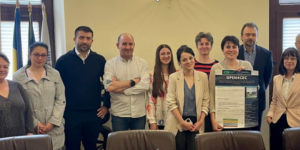THERMINATOR project, funded by the European Union under Horizon Europe program, aims to develop a new energy conversion technology in the form of an efficient low-profile energy conversion “skin”. This technology will integrate thermoacoustic and electrocaloric systems to reduce energy loss and improve energy efficiency across various sectors.
During 36 months, THERMINATOR will focus on developing a cutting-edge energy conversion “skin” to address heat recovery and resource optimization. This innovative layer is aimed at reducing energy loss and greenhouse gas emissions, by converting excess heat into electricity and operating at high frequency to achieve high power density (1W/cm2). It will also enhance thermal efficiency: suitable for use in buildings, pipes, solar cells and vehicles. It will integrate advanced technologies for sustainable and high-performance energy solutions.
One of these approaches is to install small devices in the rear sheet of a photovoltaic panel with the aim to absorb part of the heat generated during the photovoltaic effect of the cell, reducing the operating temperature. ENDEF will develop a conceptual numerical model to evaluate the potential on the temperature reduction for different scenarios (different sizes, location, areas of transfer, PV technology, etc).
Partners:
THERMINATOR consortium is formed by Europe’s top researchers and Tech innovators, including 8 partners and coordinated/led by G.A.C. Each organization contributes unique skills in areas such as material science, industrial manufacturing, and energy system integration: G.A.C. Group (France) , ElectroSciences Ltd (UK) , Brunel University London (UK) , Karlsruhe Institute of Technology (Germany), University of Ljubljana (Slovenia), ENDEF Engineering SL (Spain), Ingenieria Especializada Obra Civil e Industrial SA (Spain), CSEM SA (Switzerland)
Project budget: 2.326.551 €
Financial Framework: European Union under Horizon Europe program
Start Date: 1st January 2025
End Date: 31st December 2027
This publication is part of the THERMINATOR Project, funded by the European Union under Horizon Europe program, under grant agreement Nº 10119283 and the Swiss State Secretariat for Education, Research and Innovation (SERI).






